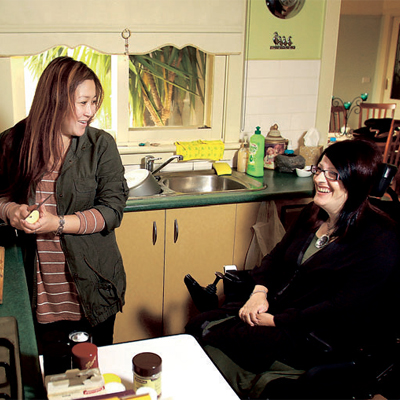Each year about 1000 Australians are diagnosed with MS, a disease which affects the central nervous system. Many sufferers are diagnosed in their 20s and 30s, Robert Fedele reports.
JACOB Taurins answers the knock at the door but is unable to open it. Silent minutes pass before his carer Linda arrives to unlock a hidden world.
‘‘I’m the carer who lives closest to Jacob,’’ she says. ‘’I’m usually the one to call.’’
Jacob, 42, has multiple sclerosis and is confined to a motorised wheelchair and has lost almost all feeling in his body.
Carers visit him day and night at the Sunshine home where he’s chosen to live alone in the house his grandparents built for the family after fleeing Latvia as refugees.
Bright and upbeat for someone in his position, he speaks in gentle, elongated sentences.
He remembers being a youthful 19-year-old when diagnosed with MS in 1987 in what he says doctors described as a ‘‘fairly obvious case’’.
‘‘I was tripping over a lot and I was getting tired. My left foot was dragging on the ground. It’s been a slow, downward progression over the last 20-odd years.’’
There’s still no cure for the unpredictable disease which affects more than 20,000 Australians.
In rare cases it can disappear after one or two episodes, but generally it progresses steadily for many years, bringing about a slow deterioration and loss of senses and functions.
It first hit Jacob while he was studying commerce at Melbourne University.
More than two decades on he’s tackling a fourth degree, in music.
Jacob learned the piano when he was nine and still adores it, miniature versions taking pride of place on the living room mantelpiece.
In many ways it’s the presence of music in his life that has kept him going.
He still dreams of getting his first-ever job as a musical composer once he finishes his degree.
‘‘It’s what I’m good at. It’s what I can do,’’ he states defiantly.
‘‘It’s growing up. I got MS when I was 19. All my friends have moved on and got work. I can get work and make my own way. I’m 42. I want to have my own life.’’
Jacob says he’s been tempted to throw in the towel numerous times but these days prefers to use his anger by turning it into positive energy.
He is a member of the Essendon North Rotary Club and was president in 2003-04.
He says blaming MS is taking the easy way out.
Jane Ruggieri, too, has experienced resentment, but is proud of not giving up.
‘‘It’s harder to be positive. It’s easier just to give up.
‘‘There’s some days where I think, this is just bullshit. I don’t want to do it any more.’’
Jane recites the date her life changed, March 23, 1990, a moment she has never forgotten.
‘‘But I look at it like I’m pretty lucky. I’ve had MS now for over 20 years. But 10 years of that I’ve been fairly good and you wouldn’t know I had it.
‘‘The hardest thing is that you don’t expect that you’re going to get to this stage, but when it comes on so quickly and you’ve lived an active life and everything’s taken away from you … it’s hard. You can get over having the wheelchair, having the stick, but the fact you can’t do what you want to do when you want to do it is hard.’’
Jane worked in the fashion industry and as a waitress at night, often racking up 100 hours a week.
One morning she woke up and could see four of everything.
After several medical tests she was diagnosed with MS. There were the usual symtoms – increased fatigue, pins and needles, numbness, deteriorating sight.
Her memory played tricks to the extent that she placed sticky notes on her steering wheel to remember where she was travelling to.
‘‘I couldn’t remember if I’d spoken to people. There were times I’d forget that I’d had breakfast. I’d get up in the morning and wouldn’t know.’’
Jane went on Interferon beta, a drug she injected every second day. It gave her a new lease on life for six years until she had a reaction.
In 2008 she had to give up work completely and was confined to a wheelchair.
‘‘It’s a big part of your life that’s taken away from you.
‘‘I have days where I wake up in the morning and I cry from the minute I’ve got up to the minute I go to bed. But you’ve just got to pick yourself up. It’s better to look forward and focus on what I can do, not what I can’t.’’
Jane says it’s understandable many people with MS go through depression.
She’s been lucky enough to have a great support network including her primary carer, husband Tony.
The hardest thing, she says, has been the impact on her daughter Jaz, now 21.
‘‘I started to deteriorate when she was 13. It was really hard for her. Jaz and I used to do things all the time and that all stopped.
‘‘It’s hard for her to see me the way I am now. But then again, she draws on my strength.
‘‘The thing that everybody has to understand is I’ve got MS, but in actual fact, my whole family’s got MS because they’re living with it too.’’
Jane says awareness about MS today has improved tenfold compared to when she was diagnosed.
The chances of sufferers deteriorating to her level have diminished, she believes.
Keilor Downs resident Sonia Parreira is nevertheless preparing for the worst.
The 40-year-old has had MS for a decade and says it changes your whole outlook on life.
She and partner Jorge bought a house in the area last year because it was near flat land and had a big bathroom.
They’re also looking at a new door that can allow a wheelchair to pass through.
‘‘I don’t need it at the minute,’’ Sonia says, ‘‘but the nature of the disease is that I may need it next week.
‘‘That’s what you do when you’ve got MS. You make decisions based on all the possible scenarios that may or may not come through.’’
Sonia was diagnosed with MS at 30 while still going through emotional issues that plagued her late 20s.
‘‘It had to be the No.1 priority. All the other garbage in life had to take a second seat.’’
The symptoms began with her feeling hot and losing feeling in her left leg, to the point where she grabbed a sewing kit and jabbed herself with a needle to try to draw some sensation.
‘‘That night was the first night of hell. From 11 o’clock that night as I was lying there in bed I’m just getting hotter and hotter. From my waist down it’s starting to disappear from me. My left leg was on fire.’’
Sonia says she no longer feels angry about developing the disease, and believes it’s just a matter of time before a cure is found, even if she may be too far gone to benefit from it.
She has become an ambassador for MS Australia and regularly shares her story.
A career-driven woman before she became ill, she’s now concentrating on spending time with her two-year-old son Dante.
Sonia manages her MS with immuno-therapy treatment, injecting herself every second day.
Her motto is ‘‘keep life simple’’.
‘‘My focus is to dedicate my energy to my son and enjoy him for the next couple of years before he goes to school and while I’ve still got energy.’’
Does the future worry her?
‘‘I’d be lying if I said to you it doesn’t occupy my thoughts. There’s days that go by where I don’t think about it. There’s other days where I think, hang on a minute.
‘‘I just want to preserve myself as much as I can and enjoy this time with him [Dante].’’








